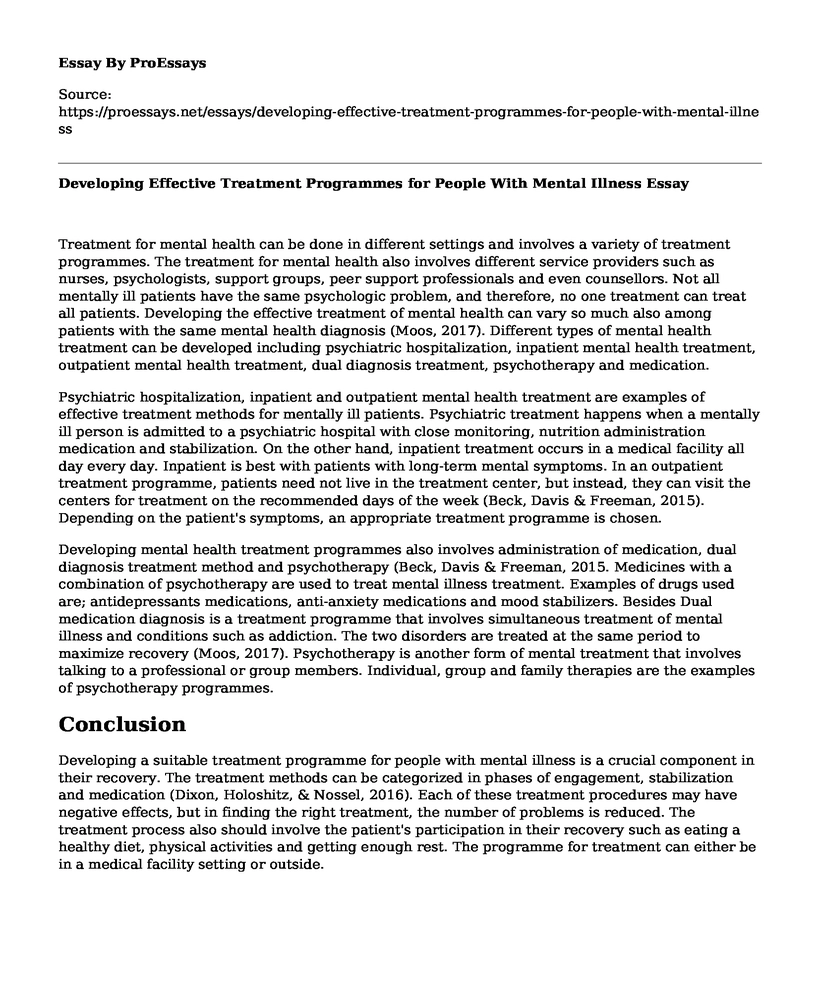Treatment for mental health can be done in different settings and involves a variety of treatment programmes. The treatment for mental health also involves different service providers such as nurses, psychologists, support groups, peer support professionals and even counsellors. Not all mentally ill patients have the same psychologic problem, and therefore, no one treatment can treat all patients. Developing the effective treatment of mental health can vary so much also among patients with the same mental health diagnosis (Moos, 2017). Different types of mental health treatment can be developed including psychiatric hospitalization, inpatient mental health treatment, outpatient mental health treatment, dual diagnosis treatment, psychotherapy and medication.
Psychiatric hospitalization, inpatient and outpatient mental health treatment are examples of effective treatment methods for mentally ill patients. Psychiatric treatment happens when a mentally ill person is admitted to a psychiatric hospital with close monitoring, nutrition administration medication and stabilization. On the other hand, inpatient treatment occurs in a medical facility all day every day. Inpatient is best with patients with long-term mental symptoms. In an outpatient treatment programme, patients need not live in the treatment center, but instead, they can visit the centers for treatment on the recommended days of the week (Beck, Davis & Freeman, 2015). Depending on the patient's symptoms, an appropriate treatment programme is chosen.
Developing mental health treatment programmes also involves administration of medication, dual diagnosis treatment method and psychotherapy (Beck, Davis & Freeman, 2015. Medicines with a combination of psychotherapy are used to treat mental illness treatment. Examples of drugs used are; antidepressants medications, anti-anxiety medications and mood stabilizers. Besides Dual medication diagnosis is a treatment programme that involves simultaneous treatment of mental illness and conditions such as addiction. The two disorders are treated at the same period to maximize recovery (Moos, 2017). Psychotherapy is another form of mental treatment that involves talking to a professional or group members. Individual, group and family therapies are the examples of psychotherapy programmes.
Conclusion
Developing a suitable treatment programme for people with mental illness is a crucial component in their recovery. The treatment methods can be categorized in phases of engagement, stabilization and medication (Dixon, Holoshitz, & Nossel, 2016). Each of these treatment procedures may have negative effects, but in finding the right treatment, the number of problems is reduced. The treatment process also should involve the patient's participation in their recovery such as eating a healthy diet, physical activities and getting enough rest. The programme for treatment can either be in a medical facility setting or outside.
References
Beck, A. T., Davis, D. D., & Freeman, A. (Eds.). (2015). Cognitive therapy of personality disorders. Guilford Publications.
Dixon, L. B., Holoshitz, Y., & Nossel, I. (2016). Treatment engagement of individuals experiencing mental illness: review and update. World Psychiatry, 15(1), 13-20.
Moos, R. H. (2017). Evaluating treatment environments: The quality of psychiatric and substance abuse programs. Routledge.
Cite this page
Developing Effective Treatment Programmes for People With Mental Illness. (2022, Aug 04). Retrieved from https://proessays.net/essays/developing-effective-treatment-programmes-for-people-with-mental-illness
If you are the original author of this essay and no longer wish to have it published on the ProEssays website, please click below to request its removal:
- Essay Sample on Family Care of Mental Health
- Post-Traumatic Stress in the Canadian Military Essay
- Essay Sample on The Ideal Love
- Essay Sample on Aging Population: Impacts, Challenges and Opportunities
- Essay Sample on Empathy: The Key to Preventing Social Problems Like Bullying
- Paper Example on Understanding Addicts: Educate Yourself to Help a Loved One
- Free Paper on Family Dynamics: Understanding Bowen's Theory of Emotional Interdependence







